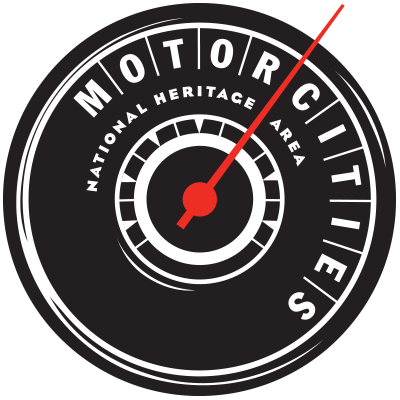By Robert Tate, Automotive Historian and Researcher
Images Courtesy of GM Media Archives/Robert Tate Collection
Published 12.15.2021
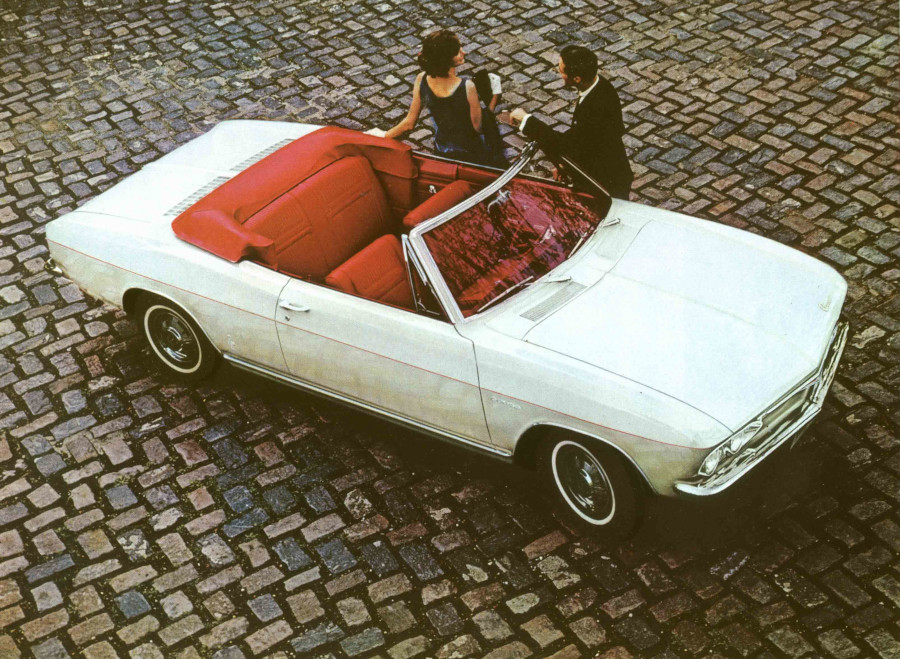 1965 Corvair Convertible (GM Media Archives)
1965 Corvair Convertible (GM Media Archives)
For 1965, the Chevrolet division of General Motors featured great looking automobiles across the board. The line proved popular, selling over a million units in 1965.
For one Chevy model in particular, the Corvair, the new styling features for 1965 marked the first major design appearance change since its introduction in 1960. All the Corvair models featured smooth, flowing new lines that many automotive consumers thoroughly enjoyed. The models sported dual headlamps that were deeply recessed into the body front panel, with parking lamps below the slim new bumper. A massive front emblem, concealing the luggage compartment lock, and the Corvair name in a bright script identified all of the great looking Corvair models.
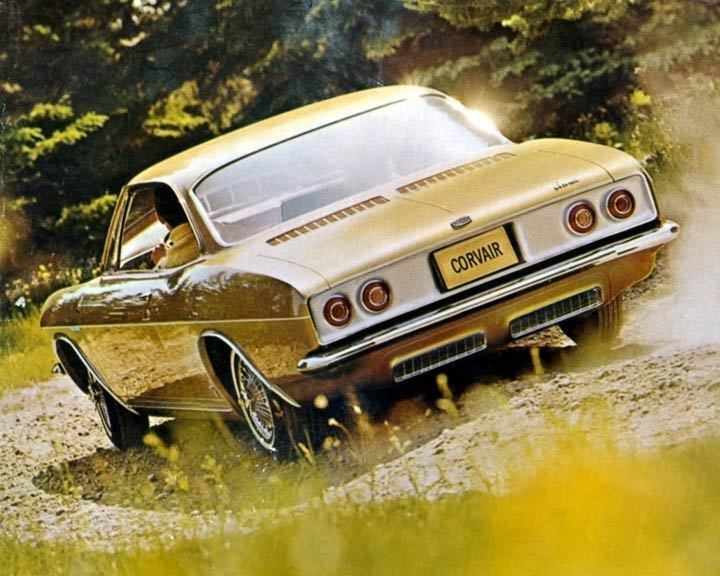 1965 Corvair rear view (GM Media Archives)
1965 Corvair rear view (GM Media Archives)
The 1965 Corvair models were introduced to the public on September 24, 1964. Newly introduced for the 1965 model year were the Corsa and Monza series -- all great looking automobiles. The Corvair Corsa models displayed a distinctive identifying emblem. Model year production for the Corvair increased to 235,500 units in 1965.
Car and Driver magazine said this of the 1965 Corvair model: “It unabashedly borrows from the best of the already established for foreign and domestic coachwork without losing any of its identity as a Corvair.” They were right.
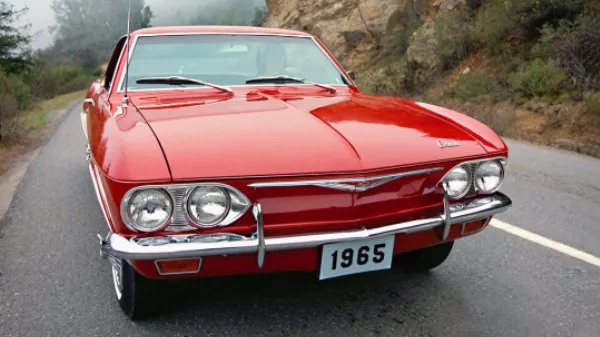 1965 Chevy Corvair Corsa Sport Coupe (GM Media Archives)
1965 Chevy Corvair Corsa Sport Coupe (GM Media Archives)
On an historical note, the Corsa series succeeded the Monza Spyder sub-series as the 1965 year’s sporty Corvair. The Corvair Corsa Coupe was priced at $2,465, but the most expensive Corvair model was the Corsa Convertible which ccame in at $2,608. The new design change for Corvair in 1965 gave the series a needed boost in production, however the division’s other small car Chevy II sales had collapsed, with production down to 122,080 units.
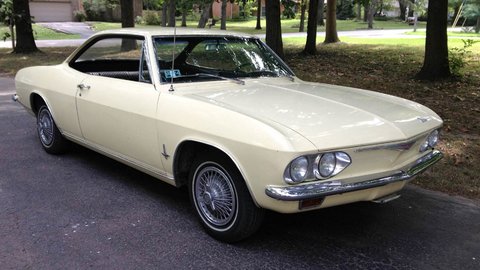 1965 Corvair owned by Van Hampton
1965 Corvair owned by Van Hampton
The Corsa and Monza models shared a new deeply dished steering wheel, and the new 500 series steering wheel displayed an attractive emblem on the horn button. The interiors for the Monza and Corsa models were both identical, offering front bucket seats with an all-vinyl trim and eight available color combinations. Interior appointments again included bright metal front seat outer moldings along with a convenient map pocket that was on each front door side panel. The Monza and Corsa models, except the convertibles, had a rear seat which could fold forward when needed. Instrumentation for the Corvair 500 and Monza models included speedometer, fuel gauge and engine warning lights for the driver. Provision for a clock was also included.
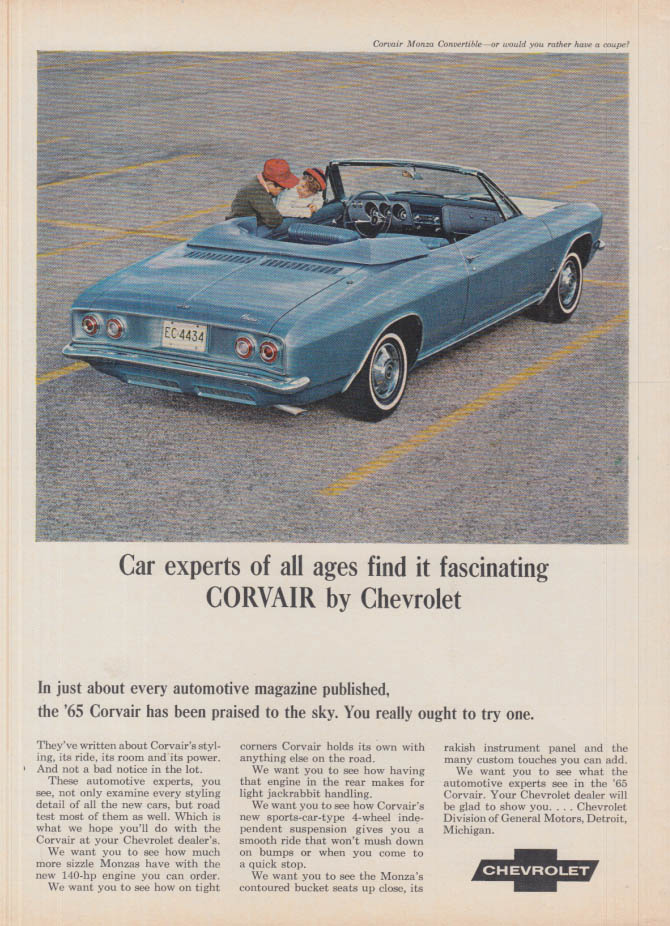 1965 Corvair Convertible ad (GM Media Archives)
1965 Corvair Convertible ad (GM Media Archives)
The new Corvair body designs for 1965 permitted the headlamps and horns to be fully protected by metal covers that extended into the trunk compartment. The 1965 Corvair models also offered a new two key system which was used for the ignition and compartment locks which could help prevent vehicle theft.
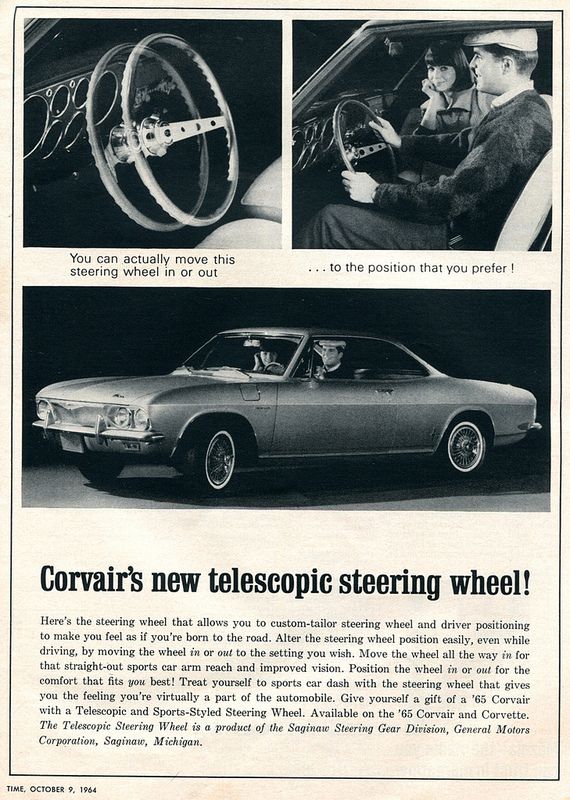 1965 Corvair ad Time Magazine (GM Media Archives)
1965 Corvair ad Time Magazine (GM Media Archives)
The Corvair was powered by a rear-mounted, air-cooled, aluminum alloy six-cylinder engine available in the base 95 horsepower, or optional 110 and 140-horsepower versions. Corvair also had a turbocharged Corsair, which could reach 0 to 60 mph in under 11 seconds and cover the quarter mile in around 18 seconds hitting 79 mph in the process.
Chevrolet supported the 1965 Corvair with an advertising campaign, including an ad with the headline “Car experts of all ages find it fascinating.” The ad featured a great looking Corvair Monza convertible in Nassau Blue metallic.
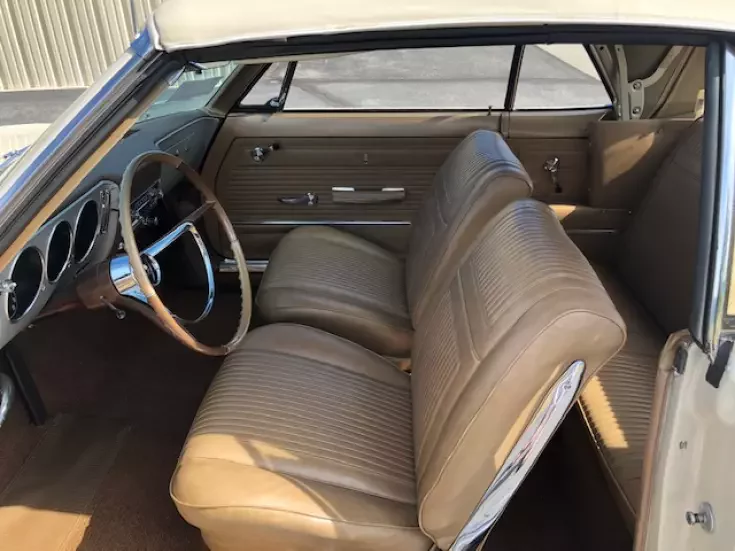 1965 Chevrolet Corvair interior (Auto Trader Classics)
1965 Chevrolet Corvair interior (Auto Trader Classics)
On November 30, 1965, Ralph Nader's book "Unsafe at Any Speed: The Designed-In Dangers of the American Automobile" was published and became an immediate best-seller. In the book, Nader targeted one car in particular -- the Corvair. He argued that the car's swing axle made the back end unstable, causing it to “tuck under during turns and skid or roll over much more frequently than other cars did."
In contrast, a government study released in 1972 vindicated GM and the Corvair, saying it was as safe as any other car, but the damage from a perception standpoint was done. The Corvair became synonymous with dangerous, or even deadly design, and sales declined.
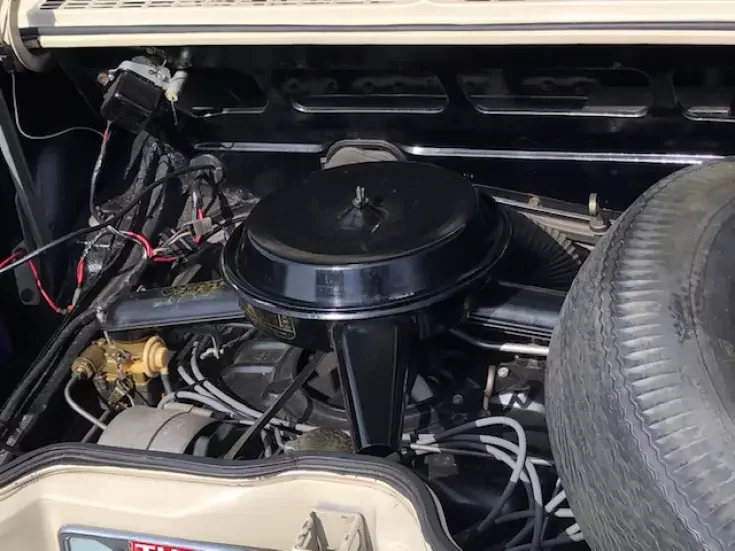 1965 Chevrolet Corvair engine view (Hemmings Motor News)
1965 Chevrolet Corvair engine view (Hemmings Motor News)
In conclusion, the last Corvair rolled of the assembly line on May 14, 1969 ending many years of great styling and some controversy. In my opinion, the 1965 models had the best design features. Today, the Corvair remains an interesting model in our automotive history books.
Bibliography
Dammann, George H. “Sixty Years of Chevrolet.” Crestline Publishing, 1972.
Kowalke, Ron. “Standard Catalog Chevrolet 1912-1998.” Krause Publications, 1998.
1969 Corvair sales material. Robert Tate Collection/GM Media Archives.

